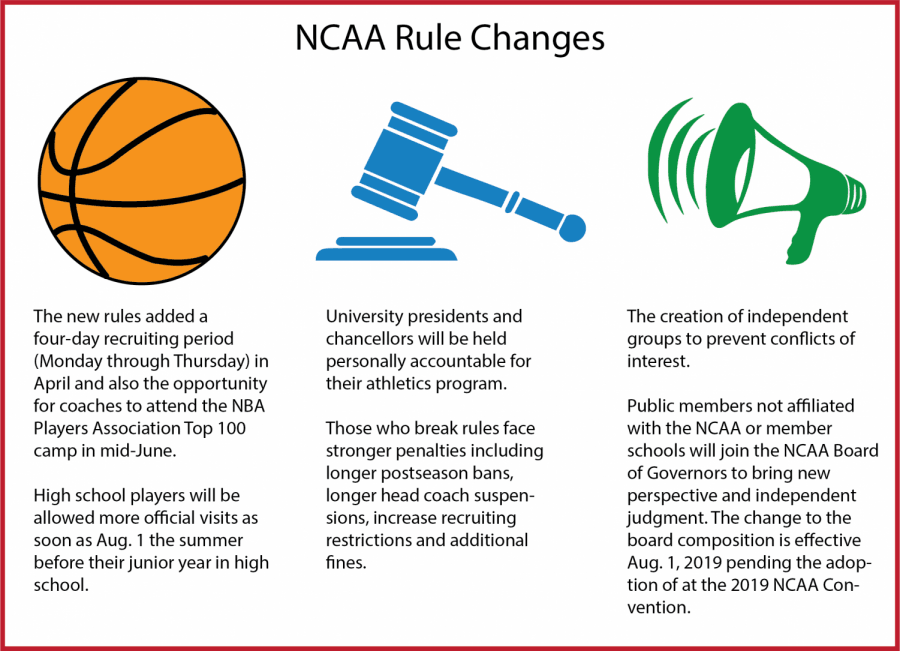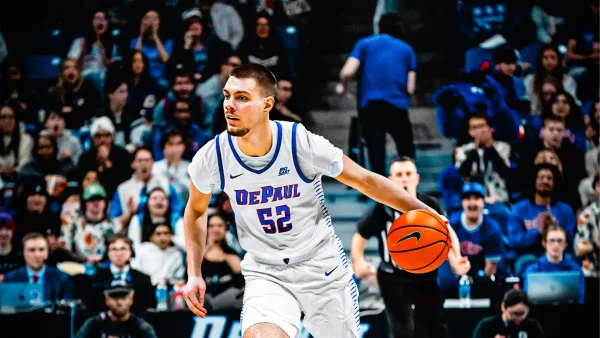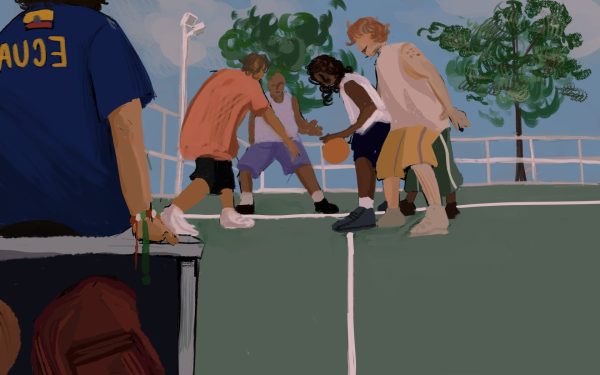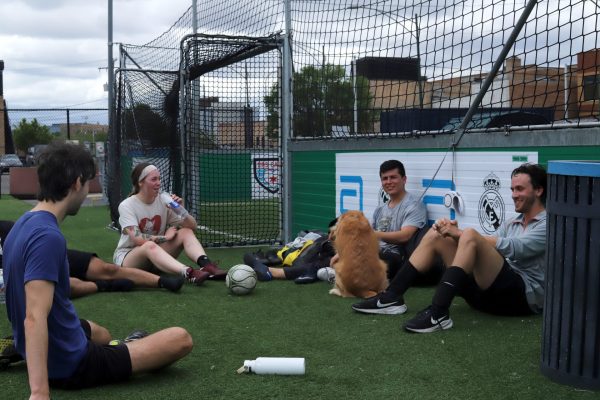Changes coming to the NCAA rules
Credit: Graphic by Annalisa Baranowski
While college basketball fans were focused on the beginning of organized practices for the upcoming season, last week also marked an event college basketball hoped to downplay.
The NCAA was turned on its head on Sept. 26, 2017 when the Southern District of New York and Justice Department announced the arrests of 10 individuals, including four Division 1 Assistant Coaches and Adidas executive Jim Gatto in connection with the FBI’s investigation into bribery and corruption college basketball.
The NCAA swiftly organized the Commission on College Basketball, led by former Secretary of State Condoleezza Rice. That report was released in April and from there the NCAA announced their first set of official changes on Aug. 8, 2018. The changes focused on three areas: basketball, enforcement and “outside voices.”
DePaul athletic director and Division 1 Council Vice President Jean Lenti Ponsetto oversaw many of the working groups evaluating different areas of the rules changes such as apparel companies, the involvement of changes, as well as the recruiting calendar. The top priority on their list was the recruiting calendar and Lenti Ponsetto pointed to the work done between the Men’s Basketball Oversight, the National Basketball Coaches Association (NBCA) and the recruiting committee as a key reason, despite over 40 conferences being represented, they found common ground with coaches as to what events were important to them.
“(They) spent a lot of time really drilling down on what were the things about the men’s basketball recruiting calendar that we should preserve,” Lenti Ponsetto said, “and what are the things that we should look at to really create a better balance of the recruiting periods and the evaluation periods.”
Lenti Ponsetto added by having these conversations at the coaching association level, by the time it came to a point where the council was ready to vote, there was already a consensus in place.
Among the changes agreed upon was a change in the recruiting calendar was a new four-day recruiting period added from Monday through Thursday during April, as well as coaches now able to evaluate recruits at the NBA Players Association Top 100-camp in mid-June, as well as attend events the last two weekends in June.
Lenti Ponsetto said this change was made with the idea of evaluating an athlete more during the academic year to get a better sense of what they will get as a college player.
“I do think to provide more of an opportunity to see student-athletes and recruit them during the academic calendar year when they’re in school gives you a much better idea of how that student- athlete can manage both the academic and the athletic responsibilities they have when they transition to college,” Lenti Ponsetto said.
DePaul’s athletic director added while AAU circuits still hold plenty of value because of the collection of elite high school prospects all facing each other sometime, the opportunity to attend high school games allows coaches to see players in a more natural environment during the school year where academics are involved as well.
As DePaul head coach Dave Leitao looks ahead to next year when many of these changes take effect as early as Jan. 29, 2019, he said many coaches will be in wait- and-see mode as to how these changes will ultimately affect their ability to recruit.
“You have to adjust with the times and so not having a full grasp on everything yet it’s hard to figure out exactly,” Leitao said. “But the one thing we’ve seen with some of the recruiting rules obviously relative to when we can go out next spring and summer is going to cause some adjustments, visits for guys that are younger now for high school juniors earlier are an adjustment.”
Leitao added that as they wait for those adjustments to come, the staff has talked about the importance of relationships with players and their families, but like many coaches they are going to be adjusting on the fly.
Under the new rules players will have five visits allotted to them between Aug. 1 and the end of their junior year of high school, five more between the end of their junior year and Oct. 15 after high school graduation, as well as five more after that date and the remainder of their college eligibility.
One rule that has been raised, but will remain up in the air likely until Association’s contract runs out in 2020, is whether players will again have the opportunity to enter the draft right out of high school. Lenti Ponsetto said while that will likely be the first opportunity to address this, she wouldn’t have a problem with players having the opportunity to pursue their opportunity, rather than force them to stay in school for a year if that’s not what they want to do.
“There have been too many opportunities, too many times where we’ve seen somebody’s only been in school for a semester and then they’re gone and that’s not really what the collegiate model of playing sports is all about,” Lenti Ponsetto said. “I don’t think there is anybody at the NCAA level who would want to do deny anybody the opportunity to go to the NBA right out of high school if that’s what they would like to do.”
She added there is a benefit to students staying in school even for a year or two but can now take advantage of the Degree Completion assistance where schools will be required to pay for tuition, books and fees for players who return to receive their degree.
Robert Kallen, a NCAA expert and visiting professor in DePaul’s economics department, was pleased to see this added, but said there is more work still to be done with both basketball and football being big businesses that still have work to providing athletes the “compensation” in terms of meals, living expenses and education they signed up for.
“I think that is a positive step,” Kallen said. “I want every athletic student to have the opportunity after their four years of eligibility are done to have the opportunity to go back for an additional four years to get a real education.”
Kallen cited North Carolina’s academic scandal, where UNC was accused of placing students in fake classes that enabled dozens of athletes to gain and maintain their eligibility, as one-example students being pressed to focus more on the athletic end than academic side. UNC was ultimately assessed no punishment after the committee concluded it lacked the power to punish the university under the rules of the NCAA, but Kallen stressed more needed to be done.
“A majority of these kids are not getting a very adequate education,” Kallen said. “The time constraints are ridiculous, at which point in time trying to balance ‘amateur athletics’ and schools is almost an impossible task.”
In addition to examining the calendar, was the NCAA’s stated goal to more closely monitor agreements with apparel companies. This rule has not yet been finalized, as Lenti Ponsetto said an apparel company working group led by Ivy League Representative Grace Calhoun, continues to work towards a resolution after previous concerns were raised about the range of staff that would be covered including, part-time employees or coaches, in addition, to the committee hoping to receive clarity on who would be required to report income of over $600. The goal would be to provide clarity into what these details entail and ensure a fair-playing field for everyone involved.
“(An agreement) to have more collaboration and transparency institutionally on the agreements between the institutions and coaches,” Lenti Ponsetto said. “(To) try and create as much transparency so that everybody knows what those apparel deals are like and then to really mitigate any risk of their being any sort of a competitive advantage and so from everything that I gathered from those conversations with the apparel companies I think we came to a really good conclusion as to best practices in that particular area so there are still some things that are being discussed and worked out.”
Lenti Ponsetto added she sees the apparel companies having more of a participatory role with the NCAA in some summer events, but more working with the national office to reduce the perception of favoritism for institutions that were sponsored by an apparel company if they were to hold an event.
As a deterrent the NCAA also strengthened the penalties including longer postseason bans of up to five years, longer head coach suspensions, and longer limitations for coaches and staff who violate rules, including potential show-cause orders.
University presidents and chancellors will also be held personally accountable for their athletics programs following the rules. Lenti Ponsetto said throughout her time as AD, each president has always met with the coaches and students separately to outline their expectations.
“One of their main themes of emphasis with our coaches and our student athletes in separate meetings is about rules compliance so I think one of the important themes in Division 1 is to make sure the presidents make their expectations of rules compliance to the athletics department, coaches and staff and certainly to the student-athletes.
With over 500 pages in the rules, however, it has always been a priority for them to keep up with rule changes that can sometimes be difficult to track, but noted under the new guidelines if violations do occur DePaul will deal with them accordingly.
“But that said, there are still going to be times when people make mistakes and there are secondary violations that get reported,” Lenti Ponsetto said. “Again it’s not the easiest of sets of circumstances, but when you have an atmosphere of compliance within the department those inadvertent moments when you have a secondary violation you work through those and we report them and then we educate and learn and grow from there.”
Although the NCAA is investigating DePaul for violations of NCAA rules and regulations, Lenti Ponsetto noted compliance is a important part of intercollegiate athletics and has always been a high priority for them at DePaul. Moving forward, Lenti Ponsetto hopes many fans have kept their eye on the rules changes made, but admitted some might just focus on the on-court performances of teams.
“If people have stayed dialed into that process then I think the general public would feel really confident that there has been change,” Lenti Ponsetto said. “But for most people the only place they care about change is what transpires on the court, is my team winning, does my team need to win more, and then for some folks the rules and regulations piece are lost on some fans but I do think that the general public I’m hopeful has really stayed a tune to all that the NCAA has attempted to make in this last year.”






